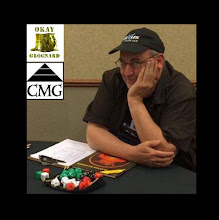A recent blog post by Wade Rockett, on his excellent Rockett Science blog, discussed some of the early examples of Attacks of Opportunity (by any name) in RPGs, noting that even as far back as First Edition AD&D there were rules meant to emulate such a situation as being attacked while fleeing. While I realize that the discussion was meant to encompass RPGs only, I couldn't help thinking about some examples in their forerunner wargames.
To that end, I recalled the early 70s SPI game Sniper (1973) which, along with its followup game Patrol (1974) had rules for Opportunity Fire. The game included pads of easy forms for jotting down the orders for your units because, in these games, actions were meant to be simultaneous. In Sniper, a player would often have a single individual while in Patrol, a small company of units. Opportunity Fire was an order whereby a hex would be designated for a shooter and any enemy unit that passed through the line of fire from the ordered unit through the designated hex could come under fire.
It was a simple example of an Attack of Opportunity but it required giving something up in order to achieve the effect. It has often struck me that in many RPGs where such a option or action existed, it was treated as an additional attack. I always thought that this didn't feel right. I personally prefer the idea that if someone takes an Attack of Opportunity, that counts as their action for that turn and can only happen if they are ready for it. By "ready," I mean to say that if someone gets the jump on you, then it simply doesn't seem possible to suddenly become quicker. So, too, if someone performs an Attack of Opportunity, then getting an additional subsequent action also seems unrealistic. To my mind, an Attack of Opportunity should be something for which someone is prepared and able to execute, and should also constitute the action taken in a given turn. Just my thoughts on a smoother mechanic meant to avoid complicating a turn and compounding it with unnecessary complexity.
Subscribe to:
Post Comments (Atom)




No comments:
Post a Comment